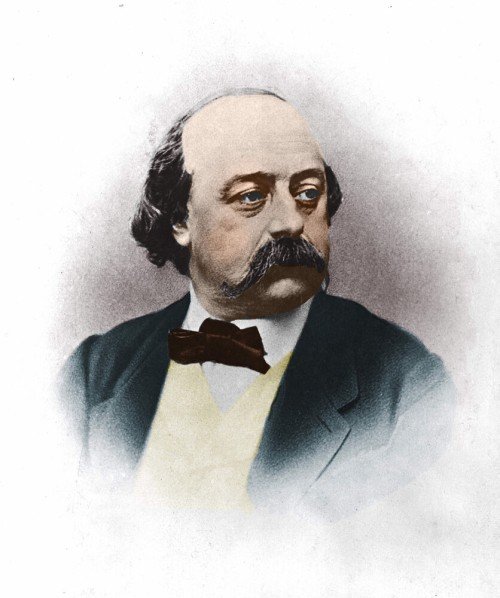
Gustave Flaubert (1821-1880) is widely regarded as one of the most important novelists in the Western literary canon. His work, which includes such masterpieces as Madame Bovary and Sentimental Education, is known for its vivid realism, psychological depth, and stylistic innovation.
Born in Rouen, France, Flaubert was the son of a prominent doctor and grew up in a well-to-do family. As a child, he was a voracious reader and showed a talent for writing from an early age. He went on to study law in Paris, but quickly became disillusioned with the profession and instead pursued a career as a writer.
Gustave Flaubert was born on December 12, 1821, in Rouen, Normandy, France. His father was a successful surgeon and his mother came from a wealthy family. Flaubert had a younger sister, Caroline, who suffered from epilepsy and died when she was only six years old. This event had a profound impact on Flaubert and influenced his later writing, as he often explored the themes of death and loss in his work.
As a child, Flaubert was educated at home by his mother and later attended the Collège Royal in Rouen. He showed a talent for languages and literature, and by the age of 14, he was already writing stories and poems. In 1840, Flaubert went to Paris to study law, but he quickly became disillusioned with the subject and decided to pursue a career as a writer instead.
Flaubert's writing career was not an immediate success, and he struggled to find his voice as a writer. He spent several years traveling through Europe and Egypt, gathering inspiration for his work. During this time, he began work on his first novel, Madame Bovary, which would become his most famous work.
Madame Bovary was published in 1857 and was an instant success, although it also caused controversy due to its frank portrayal of adultery and the lives of middle-class women. Flaubert was even put on trial for obscenity, but he was ultimately acquitted. The novel is now considered a masterpiece of 19th-century literature.
Gustave Flaubert was a prolific writer who produced several works of lasting literary importance.
Some of his most famous works include:
-
Madame Bovary (1857): This novel is perhaps Flaubert's most famous work and tells the story of a young woman named Emma Bovary who becomes disillusioned with her provincial life and begins a series of affairs, leading to tragic consequences.
-
Salammbô (1862): This historical novel is set in ancient Carthage during the Third Punic War and tells the story of a priestess named Salammbô who falls in love with a mercenary leader.
-
Sentimental Education (1869): This novel tells the story of a young man named Frédéric Moreau who falls in love with an older, married woman and is forced to confront the realities of love and life in mid-19th-century France.
-
The Temptation of Saint Anthony (1874): This experimental work is based on the story of Saint Anthony of Egypt and is characterized by its dreamlike imagery and surrealistic elements.
-
Bouvard et Pécuchet (1881): This unfinished novel tells the story of two clerks who decide to give up their jobs and pursue knowledge and experience in various fields, with disastrous results.
Flaubert also wrote several short stories, including "A Simple Heart" and "The Legend of Saint Julian the Hospitaller," as well as numerous letters and essays. His writing has been admired for its precise language, vivid descriptions, and psychological depth.
Flaubert went on to write several other novels, including Salammbô, Sentimental Education, and Bouvard et Pécuchet. He was known for his meticulous attention to detail and his dedication to the craft of writing. He spent years working on each of his novels, perfecting his language and style.
Flaubert died on May 8, 1880, in Croisset, France, at the age of 58. He had never married and had no children. He left behind a legacy as one of the greatest writers of his time, and his work continues to be studied and admired today.
Flaubert's first novel, Madame Bovary, was published in 1856 and immediately caused a sensation. The book, which tells the story of a young woman who has an affair and runs up massive debts, was seen as scandalous at the time and Flaubert was actually put on trial for obscenity. He was ultimately acquitted, but the experience left him deeply shaken.
Despite this setback, Flaubert continued to write and produced several other important works, including Sentimental Education, which is often considered his masterpiece. This novel tells the story of a young man named Frederic Moreau and his search for love and meaning in mid-19th century France. Like Madame Bovary, it is known for its realistic portrayal of life and its psychological depth.
One of Flaubert's key innovations was his focus on style and language. He believed that the writer's primary job was to find the perfect words to convey the meaning and emotion of a scene, and he spent countless hours working on his prose. This dedication to craft is evident in the precision and beauty of his writing, which is considered some of the best in French literature.
Flaubert's influence on literature has been enormous, and his impact can be seen in the work of writers such as Marcel Proust, James Joyce, and Virginia Woolf. His commitment to realism and psychological depth helped to pave the way for modern literature, and his focus on style and language set a new standard for literary craftsmanship.
In conclusion, Gustave Flaubert was a groundbreaking writer whose work continues to inspire and influence readers and writers alike. His dedication to realism, psychological depth, and stylistic innovation helped to shape the course of modern literature, and his influence can still be felt today.








